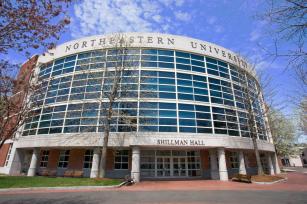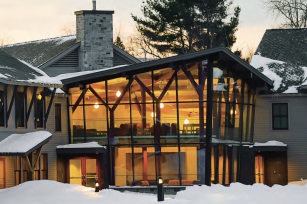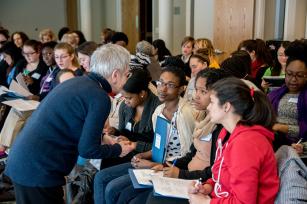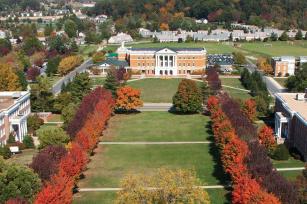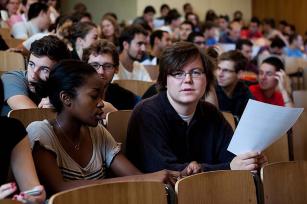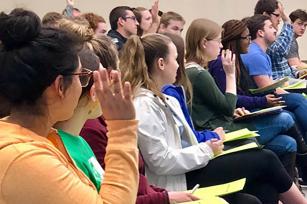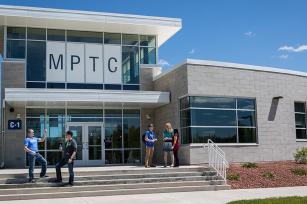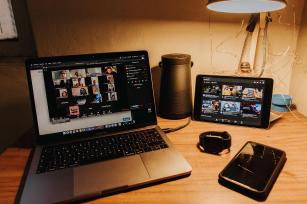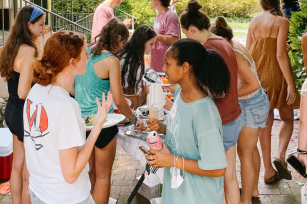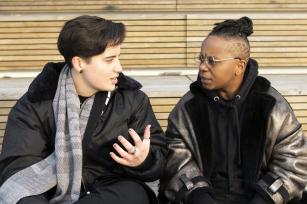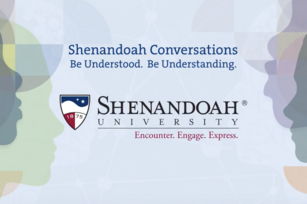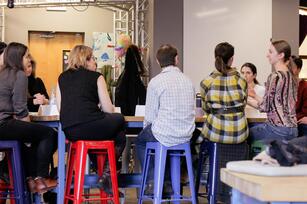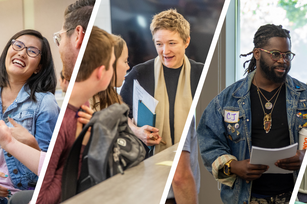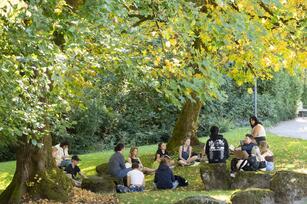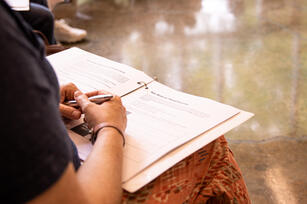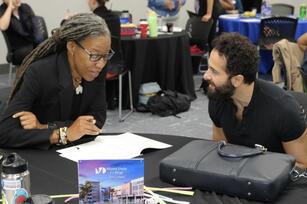
Breadcrumb
- Essential Partners
- Our Impact
- Impact Stories
- Addressing Racism and Crafting Values with Sewanee, University of the South
Addressing Racism and Crafting Values with Sewanee, University of the South
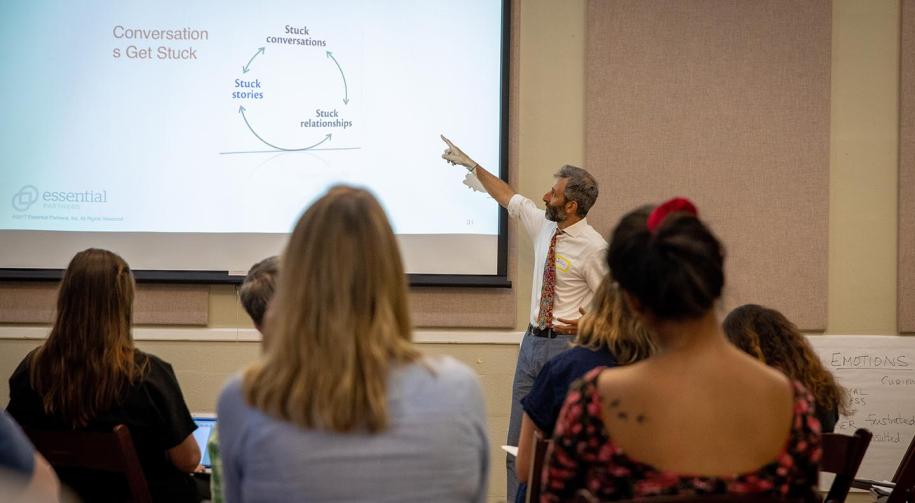
“Where other campuses have really struggled with this complex issue, dialogue really shifted the conversation about representation, power, and history into a new space, allowing it to move forward in a productive and ultimately transformative way.”
Cassie Meyer, Assistant Dean for Student Equity and Career Readiness
Sewanee, The University of the South
Sewanee: The University of the South is a liberal arts college located in Sewanee, Tennessee, with more than 1,700 undergraduate students.
In the Fall of 2018, the Office of Civic Engagement established the Dialogue Across Difference Program, which seeks to build the capacity of Sewanee students, faculty, and staff to connect across their differences through dialogue and civil discourse.
Sewanee’s Director of the new Dialogue Across Difference Programs, Cassie Meyer, invited Essential Partners to collaborate on a skill-building and program design strategy the following year. She wanted a thought partner, one who had the experience and capacity to help Sewanee build a sustainable culture of dialogue across their whole community.
Meyer had first encountered Essential Partners in her work with Interfaith Youth Core, as many of the campus partners she worked with had also partnered with EP. In addition, a cohort of Sewanee faculty had attended an EP Dialogic Classroom training in Boston before the formal creation of the Dialogue program at Sewanee.
Little did she know that Essential Partners would ultimately help the campus address incidents of racism, diversify its public history, advance student leadership, and craft a new set of University values.
Building for Sustainability
EP co-Executive Director John Sarrouf and Academic Associate Betsy Hayes worked with Meyer to co-design a training program that included a dialogue orientation, facilitator training, Dialogic Classroom workshops, community dialogues, as well as follow-up evaluation.
The multi-semester partnership allowed EP to create a sustainable basis to scale the program. Sarrouf and Hayes led the first faculty, staff, and student facilitator training in 2019. The following semester, Meyer and Sarrouf led the second training together. Finally, Meyer led the training on her own, with remote guidance and coaching from Sarrouf.
“One of the things I appreciate so deeply about working with EP is their investment in and commitment to building our capacity,” says Meyer. “Throughout our partnership, John and the team made it clear that success would mean a transition from working directly with us on campus to supporting us to do the work on our own. That also made it easy to make the case for investing in a partnership with EP—that investment would only strengthen our program and our internal dialogue skills.”
More than eighty faculty members, staff, and students participated in the three sets of workshops, imbuing the skills of deep listening, curiosity-driven inquiry, and dialogic educational practices into the entire campus.
“The Essential Partners training provided me with skills that helped us work through conflict and contrast from a place of learning, understanding, and growth,” said Sambhav Bansal, '23. “The resources Essential Partners provided me with have allowed me to formulate meaningful and thought-provoking questions to connect with others who might have differing views to mine. We have seen positive results wherever dialogue has been integrated into our programs, as it was in our Proctor (RA) training. We have also used EP’s dialogue tools to discuss complex issues, from interfaith relations to differing beauty standards across the world. These dialogues have allowed Sewanee to pause, reflect, and understand, then lead positive change in our campus community.”
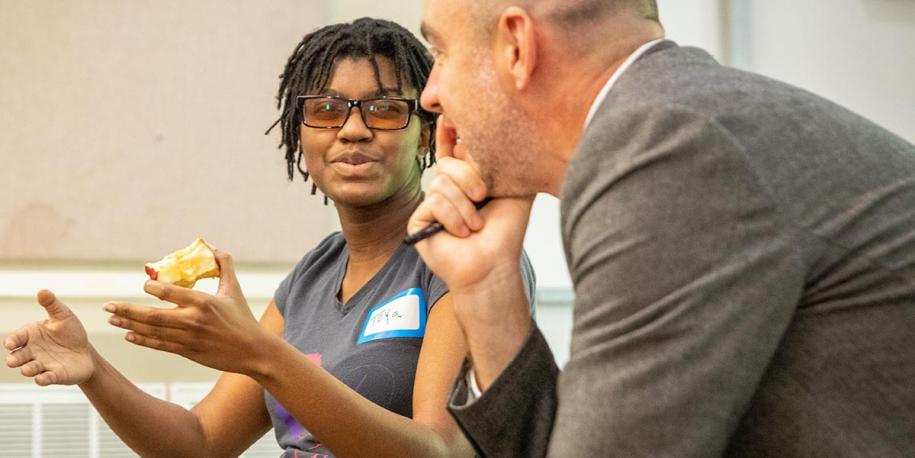
Student Ambassadors: Representation and Allyship
How do we build students skills and capacity, so they can independently use dialogue in all the spaces where they lead and create?
Meyer and Essential Partners led three years of facilitator training sessions, and each year’s application grew more competitive than the last. Where thirteen students applied in the first year, more than 70 students applied for 20 spots to participate in year two.
In the first two years, following the training, students were then offered small stipends to fund dialogue projects. In the third year, Meyer decided to test the hypothesis that there was enough interest in dialogue and facilitation training that students would participate without a stipend. That year, the program was open to all who wanted to participate. Nearly 50 students participated in the two-day intensive training, followed by dozens of student projects that engaged—and transformed—the campus community.
One student spearheaded a series of dialogues about representation in campus art, in collaboration with two EP-trained art and art history professors. They explored who is represented in paintings, sculptures, and statues, as well as the deeper meaning and values behind those choices.
The dialogues inspired portraiture students to paint more recent figures of importance, such as the first African American tenured faculty and the first Black students.
“Where other campuses have really struggled with this complex issue,” said Meyer, “dialogue really shifted the conversation about representation, power, and history into a new space, allowing it to move forward in a productive and ultimately transformative way.”
Amidst some difficult and public incidents of racism in the larger community, two white student dialogue ambassadors approached Meyer for guidance. They were hearing from other white students who weren’t sure how to engage as allies, or how to begin building a more inclusive community. These students felt nervous asking questions, anxious that they might cause more harm through missteps—and therefore chose to avoid talking about race altogether.
The students led three dialogues on white allyship with 80 students, faculty, and staff (click here to download the script they designed). Meyer, the students, and several campus stakeholders co-designed a dialogue that helped those gathered talk, openly and honestly, about the experience of making mistakes and participating in structures of racism. They reflected on what they might need to learn from missteps, avoid causing harm, and ultimately advance the goal of a genuinely inclusive community.
A Campus in Crisis
In early 2020, the Sewanee community was rocked by a series of challenges related both to the COVID-19 pandemic and a reckoning with racist incidents on campus. Senior university leadership invited the community to reflect on their shared values.
"It is up to us to decide who we are, what we will tolerate and how we will live together," said Ambassador Reuben E. Brigety II, who was then the university’s vice-chancellor and president. "I invite you to be a part of this conversation to reassert and reinforce what it means for Sewanee to truly dwell together in unity."
Meyer drew upon the skills and tools she had gained from Essential Partners to collaborate with Elizabeth Wilson, Director of the Center for Leadership, on a campus-wide initiative. Using Reflective Structured Dialogue as the core methodology, they designed a dialogue series to let community members speak about their experiences, share their hopes and fears for the future, and articulate the values that they found in themselves and in the community at large.
More than 300 Sewanee community members participated in self-facilitated dialogues, mostly on Zoom, including students, alumni, faculty, administrators. The participants reflected on when they felt proud of the university and what values those moments revealed. They also talked about those times when they felt ashamed of the community, and what values that experience revealed.
“Essential Partners’ Reflective Structured Dialogue approach was uniquely suited to the task,” Meyer reflected. “It made sure that these difficult conversations had a strong theoretical foundation as well as a clear structure, which fostered equity, vulnerability, and safety in the space. It allowed all members of the community—regardless of their identities, roles, and background—to fully engage in these difficult conversations, drawing out the complexity of the issues and identities at hand, encouraging curiosity across these differences.”
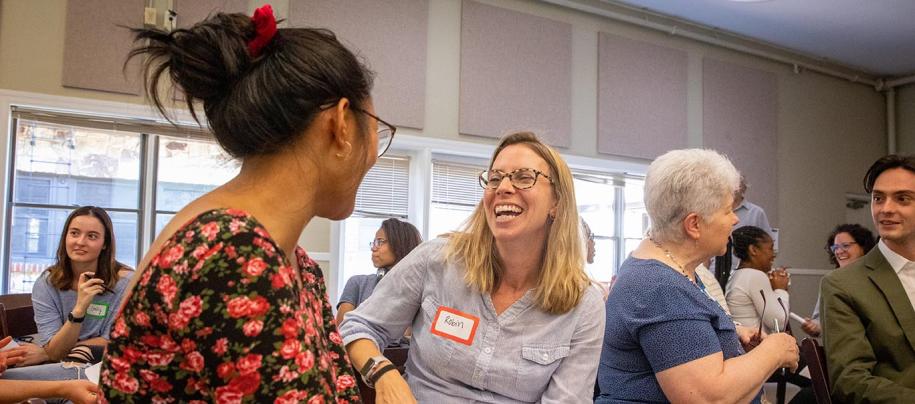
“Essential Partners’ Reflective Structured Dialogue approach allowed all members of the community—regardless of their identities, roles, and background—to fully engage in these difficult conversations, drawing out the complexity of the issues and identities at hand, encouraging curiosity across these differences.”
Cassie Meyer, Assistant Dean for Student Equity and Career Readiness
Sewanee, University of the South
Shared Values for a Diverse Community
Following each dialogue session, Meyer and Wilson used RSD to share their findings with open focus groups targeted at different constituencies within the Sewanee community: students, faculty, staff, and alumni from both the College and the School of Theology.
They then synthesized this feedback into themes, which was then revisited through another series of Reflective Structured Dialogue. The dialogue groups again reported their insights to the initiative’s leadership, reshaping and revising the initial synthesis of themes. Finally, Meyer and Wilson convened a Values Steering Committee to do the final refining work; after six months of dialogues and reporting, the Values Steering Committee crafted four university values:
- Inquiry: We develop open-minded, informed, and intellectually engaged individuals.
- Community: We cultivate respectful, inclusive, and enduring relationships.
- Flourishing: We share responsibility for the well-being of one another and the Domain.
- Courage: We strive for justice, equity, and sustainability in Sewanee and in the broader society.
“Each value reflects a mix of who we already are (actual) and who we hope to become (aspirational),” the Committee statement reads. “These represent our shared values, not the committee’s values or any one person’s values. The committee has worked conscientiously and collaboratively to ensure these values accurately reflect the input of the larger community. Additionally, these values will be reviewed every five years so updates can be made to meet the needs of the Sewanee community.”
Reflective Structured Dialogue has been instrumental to the roll-out of these values across campus. It has been used during the student and faculty orientation as well as professional development with members of the university staff, giving the whole community a chance to envision, together, how these values manifest in the classroom and campus life.
“Because of our extensive engagement with stakeholders across the whole campus, these new values have already begun to have an impact,” said Meyer. “It’s one thing to release a document and another thing entirely to help people live into the spirit of these values. We are a more whole community because of dialogue.
Related Impact Stories
Testimonials

Undergraduate StudentI started to trust everyone in the class—I felt heard and I felt that people wanted to listen. As a result, I wasn’t afraid to let my past come out and let people learn from what I have been through.
Bridgewater College, Virginia

Undergraduate StudentI feel more comfortable participating in class and less defensive when other students disagree. And because I learned more from my fellow students about their views, I now feel less competitive with them than in other classes.
Bridgewater College, Virginia

Katie Shear, Civic Engagement CoordinatorUsing what we learned from Essential Partners, staff were able to model effective and respectful communication for students. A next step would be for us to help students employ some of these methods themselves. The staff not only gained skills in communication but also left feeling supported by each other in the work that we do.
Southern Vermont College, VT

Undergraduate StudentEvery opinion was accepted. No one felt judged or uncomfortable talking to one another. These have been, by far, the best classroom discussions I have ever had.
Bridgewater College, Virginia

Noga Shemer, Associate Professor in Anthropology“When I started bringing the RSD model into the classroom, it changed everything, and I had this overwhelming sense of what the classroom could be. The student feedback was unlike anything I had seen before. Students said, ‘Wow, why haven’t we had the chance to do this before? And why don’t we get to do this more often in our education?’”
University of Connecticut

Undergraduate StudentI learned to expect the best of my classmates, even when we don’t agree. I can’t write off their opinions anymore, despite our disagreements.
Bridgewater College, Virginia

Undergraduate StudentIt’s nice to talk about things that we encounter all the time but rarely get talked about. This made me hopeful that there are people who are willing to talk about serious issues.
Dartmouth College, New Hampshire

Jamie Kleinman, Associate Professor“I want every STEM class to have a dialogue. Imagine if the students had more practice doing this in more of their classes. It really speaks to the nature of approaching this from a systems perspective and how big a need there is for that.”
Department of Psychological Science, University of Connecticut

Program ParticipantI did not anticipate having as many concrete takeaways as I do. I feel there is an immense practical application.

Etionette Nshirmirimana, Burundian Master TrainerI realized that by using the “dialogue” approach, people could talk of what is deep in their heart, especially things that have harmed them.
Burundi

Undergraduate StudentI have learned how to not be offended and to be better prepared to receive other people's communication. You don't have to agree, but you can respect the other person.
Randolph College (VA)

Kim Davidson, OmbudsI’ve gained not only confidence but tools. The Essential Partners training was worth every penny.
Oberlin College, Ohio
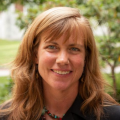
Dr. Jill DeTemple, Religious Studies FacultyAfter using this approach in my classroom, I am now more willing, and more able, to engage students in meaningful conversations about potentially contentious issues. Whereas I used to nod toward things like homosexuality in religious life, interfaith marriage, or the role of government in reproduction, now I build these conversations into the class so students can learn to speak about their experiences, and so they learn to listen and learn from those with whom they might disagree.
Southern Methodist University, Texas

Bob Bordone, Expert and AuthorEssential Partners does the best work in the field of dialogue and communication.
Harvard Negotiation & Mediation Clinical Program, Co-Founder

Janet Lansberry, Weissman Center Assistant DirectorThis was probably the most profound workshop that we ever brought to campus. It offered a really unique foundation in personal insight.
Mount Holyoke College, MA

Megan DeFranzaThere is a need not only for safe space within our churches but for our church leaders who often feel alone, or who may feel their job could be at risk if they engage in controversial conversations. How are they to make safe spaces in their own congregations for healthy dialogue if they rarely experience safe space to do the same?
Gordon College, Massachusetts

Karen Ramirez, Director of the CU Engage ProgramWe get more requests [for campus dialogue] than we could ever respond to.… I’m proud that our work on campus is actually kind of unusual, because it doesn’t support just one population. It supports everyone—students, staff, faculty, graduate students. I don’t know if there are other University of Colorado projects going on that hit all of our campus population.
University of Colorado, Boulder

Amy Cottrill, Birmingham-Southern CollegeThe past few years in our country have been the most divisive and alienating in my lifetime, which can be a tremendous challenge in the classroom that aims for community, shared experience, and listening with empathy to opinions that are different from one's own. The Essential Partners workshop I attended provided invaluable tools to meet the challenges of teaching today. It helped me reimagine the classroom as a place to help students learn the essential tools of living and learning in community and interconnection, skills that are necessary in every single area of life. I have no doubt that my teaching has been dramatically reshaped in light of my introduction to structured dialogue and I feel like I have so much more to offer my students because of that.
Birmingham, AL

Undergraduate StudentWe tackled really difficult topics and this helped everyone know each other and understand each person's individual perspective. Over the course of the semester, I became much more comfortable engaging with my classmates—specifically because of the peer dialogue groups.
Bridgewater College, Virginia

Undergraduate StudentDuring one dialogue, as we were reading The Joy Luck Club, we were asked to discuss our relationship to America. There were students who grew up in the United States and also those who hadn’t—and I was surprised to hear that everyone had equally complex relationships with the topic.
I appreciated being able to hear and express the full depth of our own context before delving into a discussion about first-generation immigrants.
Gordon College, Massachusetts

Undergraduate StudentThe professor was able to engage every student. She encouraged them to present new ideas. Dialogue helped create an environment that really deepened the understanding of the material.
Southern Methodist University, Texas

Program ParticipantThis is the best adult learning experience I have had in the past five years. I wanted to learn new skills—I did!

Program ParticipantI felt an amazing sense of accomplishment when the Essential Partners training ended; that I'd done something important for my community and something important for me.
Massachusetts

Teresa Grettano, Associate Professor and Director of the First-Year Writing programFacilitated dialogue creates a classroom atmosphere in which exploring uncomfortable issues and asking difficult questions is an expected part of the process, and it allows students space to engage each other without fear of the vitriol common in our public discourse.
University of Scranton (PA)

Undergraduate StudentAs a pharmacy major, I do not receive much training on how to handle difficult or controversial conversations. I think that this training will help me not only in my duties as a resident assistant, but in discussing medications and therapies with future patients when the conversation becomes difficult.
Northeastern University, MA

Patrick Hale, director of Multicultural and Identity ProgramsOne of the things that’s so crucial to even fostering dialogue around diversity, equity, and inclusion is creating opportunities for folks to engage in deep reflective self-awareness.
Babson College, MA

Jonathan Noyalas, Director of the McCormick Civil War Institute“RSD has been the most transformative thing in my 21 years of teaching. … Students have a greater desire to open up in class about things because they know that a Noyalas class is a safe environment. ‘I can say things here. I’m not going to be judged. I understand I’m contributing to a broader conversation.’”
Shenandoah University

Ben Meoz, VP for Student Life and Dean of Students“We want to cultivate genuine curiosity among students so that they really open themselves to the needs of others and also feel like others have an awareness of what their needs and experiences are.”
Lewis & Clark

Lucinda Garcia, Researcher, Educator & AdvocateThe Dialogic Pedagogy Fellowship at Tufts University, in collaboration with Essential Partners, gave me transformative social-emotional learning and facilitation skills to support meaningful dialogue in the classroom. I’m excited to apply what I’ve learned to design questions that invite personal narratives, value-based discussion, and comfort with complexity—all in service of building a classroom climate where productive dialogue and engaged learning can flourish.
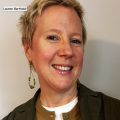
Lauren Barthold, Philosophy FacultyI’ve learned that it is not enough to announce my commitment to dialogue and expect students to know what I mean; I need concrete exercises to allow students to learn how to do it.
Endicott College, Massachusetts

Undergraduate StudentThe most significant thing for me was learning how to ask for more information rather than trying to persuade a person to think differently. I also learned helpful dialogue tips, which are more effective during difficult conversations. If I encounter a difficult dialogue with any of my residents, I plan on using the techniques I learned in this workshop to facilitate those talks.
Northeastern University, MA

Anjali Bal, Associate Professor of MarketingWe talked about where we are in the world right now, so we talked quite a bit about polarization. Essential Partners showed how these conversations are becoming more taxing and challenging because of that polarization. These were some first steps in terms of how we can start to have those conversations.
Babson College, MA

Undergraduate StudentI learned a lot about myself from others’ perspectives—it was comforting to hear similar values and ideas expressed, yet really eye-opening and intriguing to hear very different philosophies.
Dartmouth College, New Hampshire

Elizabeth Zehl, Undergraduate StudentEssential Partners' process gives people the space to be intellectually curious and to engage with others on important issues in a way that also benefits their own understanding of what they believe.
Randolph College (VA)

Undergraduate StudentAt the beginning of the semester, there was not much participation in class. But by the end, almost everyone had something constructive to add every day.
Bridgewater College, Virginia

Cricket Fuller, The Christian Science MonitorThis wasn’t a policy debate [about guns]. Instead, two people whose backgrounds and views diverged in almost every way possible shared a moment of honesty that struck at the heart of the matter.
Boston, Massachusetts

Anjali Bal, Associate Professor of MarketingOne of the things that we talked about was the ability to hear another person’s point of view, even if our minds aren’t changed. We have to remember that any sort of movement is movement. If we don’t acknowledge small movement, then we just stay on two different sides, and it’s all black and white, and we don’t hear each other.
Babson College, MA

Megan DeFranzaHere safe space was created for pastors and church leaders to wrestle with topics like evolution which are all too often “off limits” or believed to be antagonistic to the faith.
Gordon College, Massachusetts

Noga Shemer, Associate Professor in Anthropology“Students come to university so they can think deeply about issues that matter. They are the future, and the stakes are high. They want spaces where they can think these things through.”
University of Connecticut

Dr. Brooke Vuckovic, Clinical Professor of Leadership“The Dialogic Classroom is by far and away the most skillful and thoughtful professional development I have had in years as an educator.”
Kellogg School of Management

Alex Lyford, Assistant Professor of StatisticsI can't possibly overstate the positive effects the Dialogic Classroom training had on the curriculum and approach to my Introduction to Data Science class. The difference in the course from a year ago and now is night and day. My lectures are now filled with meaningful discussion and discourse—often related to sensitive topics that I wouldn't have dared touching without the training. Student feedback about these discussions has been overwhelmingly positive, and there is no chance that I would have had the wherewithal or initiative to revamp the course in such a dramatic manner without the training.
Middlebury College

Nicki Glasser, Policy CoordinatorWhat surprised me was how much you could transform a relationship during a three-hour conversation.
Transformation Center, Massachusetts

Undergraduate StudentI notice that my classmates take much more care when speaking about people who practice other religions. They make fewer assumptions, and they’re more careful with their words to make sure to avoid unintentional connotations.
Bridgewater College, Virginia

Janet Bixby, Director of Community Dialogues“Essential Partners has the magic sauce—its trainings. Working with Essential Partners and Community Dialogues has enabled us to say, ‘Hey, we have tools to help us be able to do this, and we have ways to do this. We can address these things.’ That's been incredibly useful and powerful.”
Lewis & Clark

James Rucker, Faculty MemberIt is really different than it was before. The Essential Partners process has given me the power to be heard and be seen. It’s unreal.
Randolph College (VA)

Beth MendozaDialogue gets more results. It makes decision-making easier. It makes creating participation easier … our greatest organizational impact has been more contributions as well as more effective and efficient meetings.
Moraine Park Technical College, Wisconsin

Undergraduate StudentDialogue challenged us to think more deeply about the class topics. Talking about our own thoughts and experiences in relation to the topic also challenged us to think about our own views and articulate them more clearly.
Gordon College, Massachusetts

Anne Hopkins Gross, Dean of StudentsThe Essential Partners workshop was a way of building up our ability to talk about more difficult issues, such as poverty and GLBTQ safe spaces. It was really the foundational entrée into those more challenging issues of race, ethnicity, sexuality, and gender. People walked away feeling much more confident about having difficult conversations.
Southern Vermont College, VT
